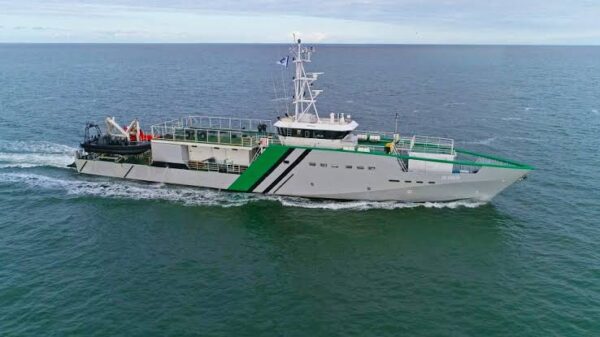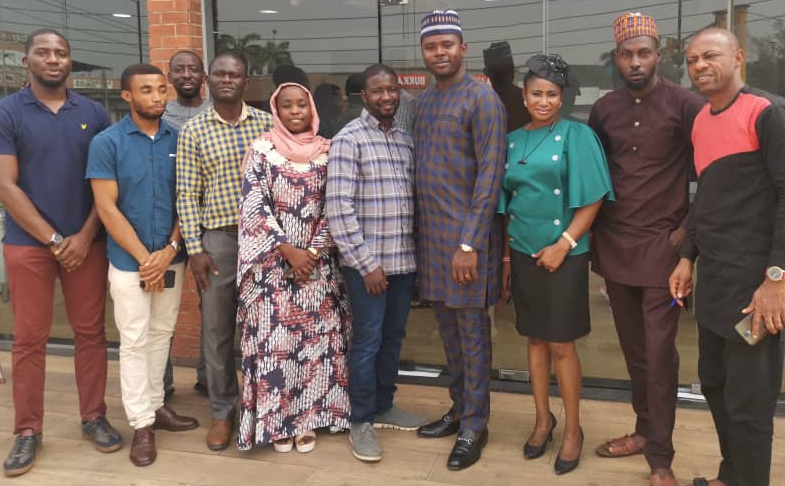$197m Deep Blue Assets Lying Fallow In Lagos Naval Dockyard
- Pirate Attack: Danish Navy’s error resulted from panic – Jamoh
- Monetary incentives are a delight to ship owners – Capt. Iheanacho
Eight months after Nigeria made a bold statement of determination towards taming the menace of piracy and sea robbery in her territorial waters and the Gulf of Guinea (GoG) with the inauguration of $197million (about N75billion at N380 exchange rate) integrated national security and waterways protection infrastructure, called Deep Blue Project, the assets remain domiciled at the Naval dockyard in Marina, Lagos.
This is coming on the heels of revelation that the deployment of some of the assets has been stalled by lack of organogram and proper structure outlining the roles and responsibilities of key stakeholders in the Ministry of Defence; Nigerian Navy, Army and Airforce and the Ministry of Transportation; Nigerian Maritime Administration and Safety Agency (NIMASA).
NIMASA’s Director General, Dr. Bashir Jamoh disclosed this challenge of operational structure while engaging journalists penultimate week, stressing that the full benefits of the Deep Blue assets wouldn’t be realized until a clear organogram, which spells out responsibilities of all stakeholders, is attained.
While maritime threats loom at the Eastern region, MMS Plus learnt that most of the non-operational Deep Blue assets are at the Navy base in Lagos, even as Naval experts argue that these assets shouldn’t be there.
“These assets should be patrolling because to get a ship ready isn’t a one-minute job. You have to do lots of checks before sailing. If an incident occurs 100miles out, it would take the asset 9-10 hours to get to the location. Which pirate is going to wait that long? The assets are even packed in the Naval dockyard where you need lots of bureaucracy and approvals to leave,” a Navy source said.
In what seemed like a test of the capacity of the NIMASA Deep Blue Assets, a Floating Production, Storage and Offloading (FPSO) vessel, named Trinity Spirit, exploded last week within Nigeria’s territorial waters, generating fear in its raging fire and thick smoke.
The smoldering fire defied the belated unprofessional rescue efforts by an unknown group of jesters occupying a rescue facility sighted in a viral video as three were confirmed dead, but the availability of Deep Blue assets could have changed the narrative if they had been deployed.
Meanwhile, a former NIMASA Director of Shipping Development, Capt. Enisuoh Warredi has indicated that the Deep Blue assets developed by an Israeli company, Homeland Security International (HLSI), aren’t suitable for the Nigerian maritime environment.
Warredi, who was speaking with MMS Plus during an exclusive chat, lampooned the agency for acquiring assets without strategic planning for the utilization, also asserted that an organogram is too trivial to impede the utilization of the Deep Blue Assets.
His words: “Every country has its unique issues as it relates to maritime. There is no single solution that would guarantee success in all maritime domains. A nation ought to study its waters and know its problems before investing in assets. You don’t invest in assets and begin to figure out how those assets would address your problems.
A proper understanding of the problems should guide a nation on the appropriate type of assets. This is what we have done with the Deep Blue Project assets. It’s like we put the cart before the horse.”
“For example, we should take the statistics of the kind of pirate attacks in the country. How far are these attacks in terms of nautical miles? In some cases the attacks are upto 100miles out, but in other cases they are closer. Understanding this would better inform a nation on the assets to acquire and how to deploy them. It’s very difficult to find a normal helicopter going out beyond 100miles. The normal range is 70 miles out and 70 miles back. If you fly 100miles out and you can’t stay for more than one minute before returning, what’s the plan of that asset?”
“All those demonstrations coming down the helicopter didn’t envisage that someone could shoot you down in the middle of the ocean. These are strategic thinking that should have been done before acquiring the assets. So, at best the helicopters can only be for rescue and not response. It is when you have neutralized the environment that you can send the helicopter to pick up injured or arrested persons. Organogram shouldn’t be a big issue limiting the functionality of the assets. This should have been sorted out before the assets arrived.”
The shipping expert also expressed worry on the personnel trained to man the Deep Blue Project, asserting that training was done based on sentiments, instead of qualification and expertise.
“It’s true that they have been training people but what are the qualifications of these people. The easiest person to train for anything on water is someone who has experience on water. If you pick someone because he is your relative and you’re training the person on maritime, it’s a dual problem for the trainee and the trainer. There must be some necessary prerequisite before someone can be employed for such operations.”
“Before I was employed by the Australian Maritime Safety Authority (AMSA), the requirement was that I must have had an Australian Master Class 1 which is an Australian Ship Captain Certificate and another key requirement was that I must have had a minimum of three years work experience on the oceans. In Nigeria, we see people who don’t know anything about marine life recruited and trained to fight pirates who are more advanced than ship captains,” he said.
Speaking on the location of the Deep Blue assets in Lagos, Warredi said, “During the time I was running the Global West vessels, I strategically positioned the ships at seas, anchorage and different locations. This way, as soon as any incident occurs the closest ships will respond. If we have all Deep Blue Project assets in Lagos and a ship is attacked in Onne it would take days to get to Onne. This shows that there is no strategy at the moment and it’s time to get a professional to develop this strategy.”
Meanwhile, the spokesman of the Nigerian Navy, Commodore Suleiman Dahun told MMS Plus that only NIMASA could comment on the whereabouts of the Deep Blue assets.
When contacted to comment on the impact of the Deep Blue Project since its deployment almost a year ago, the Chairman of Integrated Oil and Gas Limited, Capt. Emmanuel Iheanacho declined giving an assessment.
He, however, noted that 2021 was characterized by huge losses for ship owners with fewer cargo traffic and tough fiscal conditions since the outbreak of the COVID-19 pandemic.
“The whole world is coming out of the recession following the COVID-19 pandemic. It’s only when there is freedom for people to engage in trade that ship owners would have an opportunity to carry some of that trade as a business. We are hoping that 2022 will be much better than 2021. 2021 was characterized by paralysis as people couldn’t move. We are thankful that all that seems to be passing now. Hopefully, we would have better trade and maritime activities going forward,” he said.
Speaking on the proposed monetary incentives for indigenous ship owners, Iheanacho expressed delight at the move by the government to compensate people who were negatively impacted by the COVID-19 pandemic.
“We have not seen details on how that would be implemented. I only read it in the newspapers but it’s a good policy to empower operators in the maritime sector. Nevertheless, we don’t have any details on this yet,” he said.
When quizzed on the operation of the Danish Navy which killed five suspected pirates, the NIMASA boss, Dr. Jamoh agreed that there are lots of problematic issues attached to that operation.
He, however, stated that the Federal Ministry of Foreign Affairs, Ministry of Justice, Ministry of Defence, CNS and NIMASA met and agreed on the common front that Nigeria should take.
“We transmitted the position of Nigeria to the Danish embassy and we are still working on this. There are lots of mistakes and errors on the rules of engagement of the Danish Navy on the GoG. The issue of international laws as it relates to piracy also has some misconceptions on several aspects. The most important thing in that operation is for both countries to learn from their mistakes and forge ahead.”
“Most times, when there is panic in terms of security, people tend to behave hastily to protect their interests. This leads to genuine mistakes or deliberate mistakes. There are mistakes attached and we are working towards addressing these mistakes with the international community,” Jamoh said.








